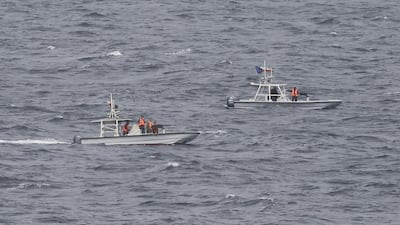Donald Trump may embrace a plan that would escalate counter Iranian measures in the Arab Gulf, Yemen and Egypt while largely avoiding any confrontation with Tehran's paramilitaries in Iraq and Syria.
The long awaited Iran strategy review was presented to the US president during a national security council meeting on Friday and calls "for more aggressive US responses to Iran’s forces," according to Reuters.
The proposal was prepared by defence secretary Jim Mattis, secretary of state Rex Tillerson and national security adviser HR McMaster, Reuters reported. It is expected to be released by the end of the month.
A US official confirmed to The National that the meeting had taken place and that the Iran review, which started early in the summer is nearing its completion.
The plan is intended to increase pressure on Tehran to curb its ballistic missile programme and support for militants in the region.
A US official told Reuters that the policy would involve more aggressive interceptions of Iranian arms shipments, including those to Houthi rebels in Yemen and Palestinian groups in Gaza and the Sinai Peninsula.
The plan also recommends the United States is more aggressive in tackling Iranian influence in Bahrain.
A high level Bahraini delegation recently visited Washington and was pleased with the Trump plan taking shape to counter Iran, diplomatic sources told The National.
_________________
Read more:
Avoiding civilian deaths ‘highest priority’ says US pilot fighting ISIL
Life inside the aircraft carrier USS George HW Bush – in pictures
Iran ‘harassed’ US aircraft carrier in Strait of Hormuz
_________________
The proposal would also mean the US Navy could respond more forcefully when confronted by armed speed boats operated by Iran’s Islamic Revolutionary Guard Corps. The confrontations usually take place in the Strait of Hormuz.
The plan does not include escalating US military activity in Syria and Iraq, where the priority remains defeating ISIL.
A senior US official told Reuters that looser rules risked embroiling Washington in a conflict with Iran at a time when US forces remained overstretched.
Mark Dubowitz, the executive director at the Foundation for Defense of Democracies (FDD), said he was not surprised by the proposal.
"The administration may want to sequence its regional strategy by first demolishing ISIL before turning its attention to neutralising and rolling back Iranian aggression in Syria and Iraq," he told The National. "But it better not wait too long" the expert cautioned or "the Iranian regime will be deeply entrenched from Iran through Iraq, Syria, Lebanon and into the Mediterranean."
At that point "it will be impossible to dislodge without a major commitment of US firepower" Mr Dubowitz said.
Faysal Itani, a senior fellow with Atlantic Council's Rafik Hariri Center for the Middle East, said the proposal conforms with Mr Trump's modus operandi in the region.
The US President "wants to push back against Iran mostly in the sense of protecting allies from direct Iranian threat, be it against Bahrain or in Saudi Arabia via Yemen,” he said.
"Obviously these are the allies' primary concerns, that come ahead of Iran's role in Iraq and Syria."
Mr Itani called the proposal "cautious and unambitious, but admittedly focused on issues of primary concern to allies."
"All the measures mentioned in the report are basically actions on the periphery that are conservative and do not change the strategic equation," he said.
One variable that could tip the balance according to Mr Dubowitz is Mr Trump's verdict on the nuclear deal, known as the Joint Comprehensive Plan of Action (JCPOA).
Mr Trump's "strategy will not be paralysed by the deal" said Mr Dubowitz in contrast with his predecessor Barack Obama. "Mr Trump is prepared to walk away at any time, and to use instruments of American power and not be deterred by Iranian regime nuclear blackmail," he said.
Reuters reported that most of Mr Trump's national security aides favour remaining in the pact, as do US allies Israel and Saudi Arabia despite their concerns about Iran’s adherence to the agreement.
“The main issue for us was to get the president not to discard the JCPOA … but he had very strong feelings, backed by Nikki Haley [US Ambassador to the United Nations], that they should be more aggressive with Iran," an official told Reuters.


